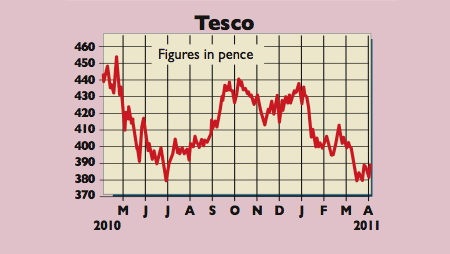
Another play on British frugality and Chinese growth is Tesco, the world’s third-largest retailer. Tesco dominates the home grocery market (70% of sales), with a share of around 30%. That’s almost double that of its two closest rivals, Asda and Sainsbury’s, on 16%-17% each.
Its own-label ‘Value’ and ‘Finest’ ranges are Britain’s top two brands, delivering revenues of £1bn each. Given its immense scale, the group should gain as price-conscious consumers trade down from premium outlets, such as Waitrose and Marks & Spencer.
However, all the best action is taking place overseas. For instance, China’s grocery segment is worth an enormous £600bn. That dwarfs Tesco’s £1bn sales, which are set to quadruple within five years. But that’s not all.
By 2025, there are forecast to be 221 Chinese cities with a population of more than one million compared to just 35 cities in Europe. Tesco’s goal is to build hypermarkets in second- and third-tier-cities, with 200 such stores open by 2015, compared to just 110 today. Eventually the country should become its most important earner.
The firm is also having considerable success in South Korea, the world’s 13th-largest economy. Its Homeplus brand is already the number-two player. It has a 9.2% market share operating from 118 hypermarkets and 245 express stores. Elsewhere, there are exciting opportunities too – in America, through its Fresh & Easy chain, and in eastern Europe, India and Turkey (with the only headache being Japan).
Tesco (LSE: TSCO), rated a BUY by Nomura
That said, this is a marathon growth path, not a sprint. But with its devoted attention to detail, who would bet against the group? In a recent study, research house IGD estimates that Tesco will expand on average by 7.5% per year and push turnover up to £106bn by 2015.This is faster than its international rivals, America’s Wal-Mart, France’s Carrefour and Germany’s Metro. No wonder Tesco has caught the eye of legendary investor Warren Buffett, who owns a 3% stake.
In terms of the numbers, the City is predicting revenues and underlying earnings per share of £61.6bn and 32.1p respectively for the year ending February 2011. That puts the stock on a skinny price/earnings (p/e) ratio of 12.1, while it also offers a 3.6% dividend yield.
However, I would value the British business on a ten-times earnings before interest, tax and amortisation (EBITA) multiple (or £25bn), the foreign operation on 0.9 times sales (£18bn), and everything else (such as the Tesco Bank) at £2.5bn. Add this up and deduct net debt of £7.6bn and a £1.5bn pension deficit, and I arrive at an intrinsic worth of about 450p per share.
Sure, there are risks – not least cut-throat competition, foreign-exchange fluctuations and the retrenching British consumer. Yet Tesco still looks like one to pop into the shopping basket. Results are out on 19 April. Nomura has a price target of 500p per share.
Recommendation: BUY at 390p